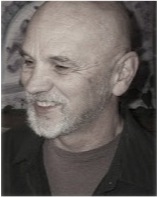This is the Rope;
30 feet long, the length of five good-sized men, 3/4″- 1″ diameter, thick, heavy manila hemp rope, boiled and stretched, taut, no give, waxed, soaped or greased
In the morning
His unheated cell
A hole in the floor
Years in prison
The beady eyes watch as the guards place him in the glass enclosure. That’s when he sees his children.
This is the noose;
A slipknot, coiled 13 times, thick, placed under the left ear to slide up easy against the flesh
The former prime minister
vanquished
How they’ve grown, he marvels, seeing them, his feet cuffed, his fight gone, the great mystery upon him. He wants to reach out to them.
This is the human neck;
Jugular veins, arteries, a portion of esophagus, vocal cords or larynx, cervical spine, muscles interlaced with seven cervical vertebrae and eight pairs of nerves
As he steadies himself, sharp pains run through his scrotum where for months they zap him day in and day out. When he shifts his weight, left to right, heat zings through his legs up and through the left side of his neck and, like a lasso, around to his right shoulder.
This is the Long Drop;
The prisoner’s body weight multiplied by the length of fall and the force of gravity (approximately 1,100 ft lbs), coupled with the slip knot against the left ear, jerks the head backwards and sideways violently with a cracking sound and fractures/dislocates the upper neck vertebrae, between C2 & C3, crushes and severs the spinal cord.
“Daddy,” Marseilles calls to him.
“My little M,” Tarik answers with lightness that surprises him. “My little M, you’re so handsome.”
In
khaki shorts
a belt
a freshly ironed
white shirt
His older sister, Bennie they call her, towers over him. She’s flowered, too.
Her
black hair long
to her
waist
her skin
bright
shining
her silky blouse
white
She studies her father. Anxiety lines her face.
The Drop
The compounded force severs the carotid arteries and the jugular veins and the neck constricts by as much as five inches. In the extreme, decapitation rips the head from the body which flops to the floor, twitching like a freshly caught fish.
The guards, his people, not the invaders who come everyday, who jeer and zap, step back, recede professionally. He gets to know them and they are all right. They have a job and he respects and understands their responsibilities.
“Daddy, when will you come home?” Marseilles says.
Bennie turns away, grabbing Marseilles, whispers something in his ear.
Resist or
assimilate
Tarik whispers
to himself
My boy who
Resisted
Marseilles
My girl who
Fled not
The bombs
Bennie
My girl who
Would not assimilate
Unlike the guards
who
live
Option# 1
Hood – when witnesses prefer not to see the faces and the eyes of those about to die and after hanging, their bodies suspended, the same eyes enlarged, popped out of the skull or in their heads separated from the body
The oppressed assimilate. Those who refuse, die.
We can’t
understand
who
we become
until
the end
Option #2
Pinioning – strapping or handcuffing hands and feet prevents the condemned from latching onto protuberances and/or straddling trap doors
“Can I touch them?” he asks the guards and reaches into emptiness, his wrists bound.
Marseilles hesitates, looks at his sister, who shakes her head. Tarik realizes the awkwardness.
One
of the guards
turns his head
Tarik rolls his shoulders.
“Sometimes,” he says to Marseilles, “I have to take one step and move my arm like this and then I feel better,” forcing a smile through the lightning pain.
Bennie bites her lip, presses her hand against her neck and the lower part of her jaw, traces a line under her left ear.
“I think we have to go,” she announces, tapping Marseilles on the shoulder. “We should go. We will wait for you.”
“Thank you for coming,” Tarik says to them as one of the guards steps forward.
Option # 3
Clothing – prison jumpsuit or white shirt
As they begin to dissolve, as Tarik loses sight of them, as the mystery approaches, the other guard comes alongside him.
“Your shirt, he says. “I will button to the top for you.”
Tarik listens.
“It is a white shirt” he asks, “isn’t it?
Marseilles and
Bennie
fade
become
wisps
as they slip
the black hood
over his face
as they button
the white shirt
against his neck
under the
slip knot
as he drops
as his body
flops hard
twitching onto
the concrete
The beady eyes gloat. As Tarik appears, Marseilles and Bennie shimmer with excitement.







